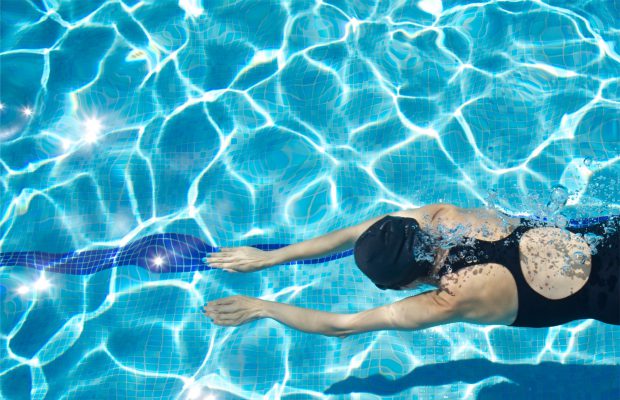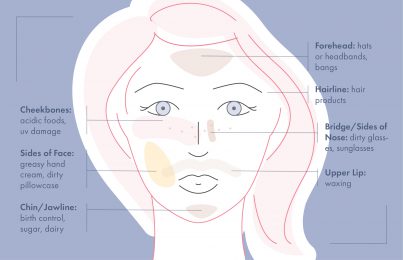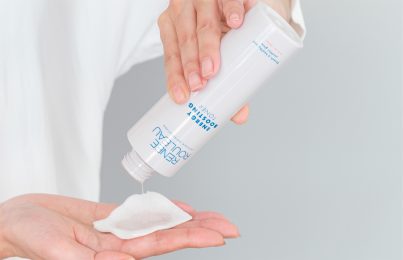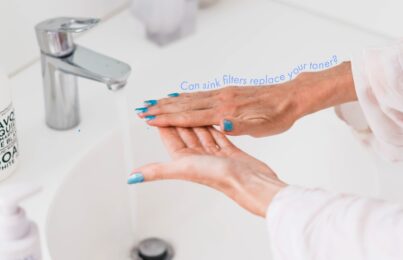Updated 06/24/25. If you regularly swim in a chlorinated pool, you’re probably familiar with how your skin can feel dry and tight once you get out of the water. That begs the question (or a few different questions, really), is chlorine bad for your skin? What problems can it cause for my face? And finally, how can you prevent it from causing problems in the first place?
As someone who absolutely loves to swim, I would never suggest giving up on the pool. You just have to know how best to care for your skin once you get back home. That’s where I, an expert esthetician, come in. Keep reading to learn my five best skin tips for pool swimmers.
How Does Chlorine Affect the Skin?
Chlorine is a chemical that’s used to disinfect pool water and keep it safe for swimming. Although it’s very beneficial for that purpose, its pH makes it less than beneficial for the skin.
The pH that’s needed for a pool to stay clean is around 7.3, whereas the skin’s natural pH is around 5.5. Exposing your skin to chlorine (for even as little as five minutes) will raise its pH and put it in an alkaline state. When you raise the skin’s pH, you’re causing dryness. That’s never a good thing, but it’s particularly negative for anyone who has a dry skin type or has a condition, like eczema.
This discussion just goes to show how important it is to use a gentle, pH-balanced cleanser like Moisture Protecting Cleanser. Changing the skin’s pH, even slightly with an off-balanced cleanser, can disrupt the moisture barrier. Symptoms of a disrupted moisture barrier include dryness, dehydration, sensitivity, redness, and roughness. And no one wants that!
5 Skin Tips for Pool Swimmers
1. When Swimming Outdoors, Apply Sunscreen that’s Formulated for Dry Skin
Most people prefer lightweight sunscreens that don’t feel heavy or greasy on the skin (especially throughout the hot summer months). However, when you’re swimming in a chlorinated pool, a heavier formula is better, no matter your skin type. The reason is that heavier sunscreen formulas usually contain oils. These oils can provide a protective seal, creating a barrier between your skin and the pool water. This will help prevent the chlorine from drying out your skin.
A good bet is to use a water-resistant sunscreen formula. (I love using this water-resistant sunscreen by Elta MD.) This will not only keep the sunscreen in place for a longer amount of time, but it will also cause the water to bead off the skin. Save your lightweight sunscreen for when you’re not swimming in an outdoor pool.
2. When Swimming Indoors, Apply a Face Oil
If you’re swimming in an indoor pool, and there’s no sunlight present (maybe you’re swimming at night or there are little to no windows), then sunscreen isn’t necessary. However, you still want to protect your skin from chlorine, which is why I suggest applying a few drops of face oil. (Something with jojoba oil is nice.) This will create the barrier you’re looking for, preventing the chlorine from drying out your skin.
3. Shower Immediately After You Get Out of the Pool
When you get out of the pool, head straight for the shower to rinse the chlorine off your face and body. After all, the longer the chlorine remains on the skin, the more likely it is that dryness and disruption to your moisture barrier will occur. Rinse it off quickly to limit these effects. Then, follow up with a body lotion to moisturize your skin.
4. Use an Alcohol-Free Toner
As for your face, wash it with a gentle cleanser. Then, apply an alcohol-free toner to restore the skin’s pH (this is just one of the reasons alcohol-free toners are so important). Once you’ve done that, follow up with a moisturizer immediately. The key is to apply it while your skin is still damp from the toner so that its hydrating properties will be sealed in. I call this the “Golden Minute Rule,” and it’s one of the easiest ways to make sure your skin is plump and hydrated.
You can also consider applying a hyaluronic acid serum in-between toner and moisturizer for even more hydration.
5. Apply a Hydrating Face Mask
Whenever you’re exposing your skin to an environment that could cause dryness or dehydration—whether that’s a chlorinated pool, an airplane cabin, or extreme heat—it’s a good idea to apply a face mask.
If you have an oily or combination skin type that’s prone to breakouts, I recommend using a water-based gel mask, like the Rapid Response Detox Masque. This will deliver water-based hydration to thirsty skin cells. If you have a normal to dry skin type, you can use a cream-based mask, like Rest Day Masque (and better, yet, sleep in it!). This will give your skin the oils it needs for a smooth, soft texture.
Don’t know your skin type? Take the Skin Type Quiz to find out and get personalized product recommendations.
The Bottom Line
Swimming is one of the best forms of exercise for all ages, so keep up with this great activity! Just be sure to give your skin a little extra care, so it can stay protected from chlorine and other drying chemicals. This holds true whether you’re swimming in a traditional pool or a saltwater pool since saltwater pools still use chlorine and can be just as drying to the skin. If you follow these steps, your skin will stay moist, supple, and healthy-looking!
Celebrity Esthetician & Skincare Expert
As an esthetician trained in cosmetic chemistry, Renée Rouleau has spent 35 years researching skin, educating her audience, and building an award-winning line of products. Her hands-on experience as an esthetician and trusted skin care expert has created a real-world solution — products that are formulated for nine different types of skin so your face will get exactly what it needs to look and feel its best. Trusted by celebrities, editors, bloggers, and skincare obsessives around the globe, her vast real-world knowledge and constant research are why Marie Claire calls her “the most passionate skin practitioner we know.”



